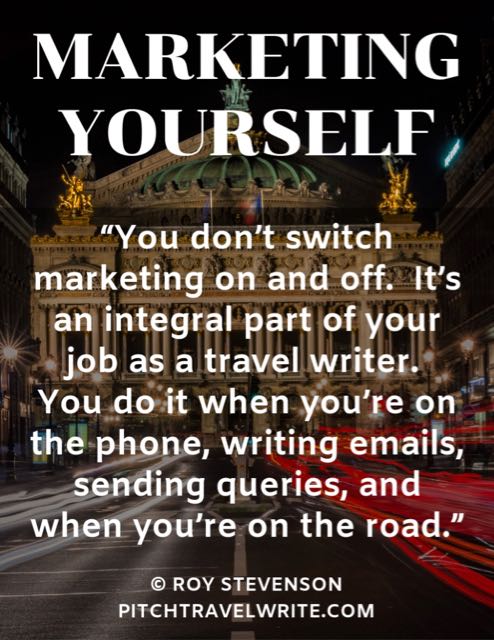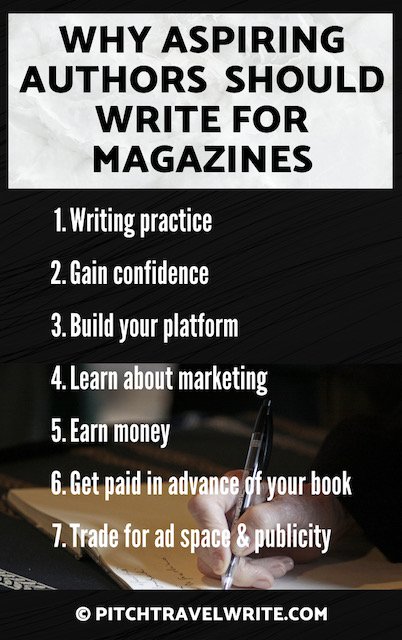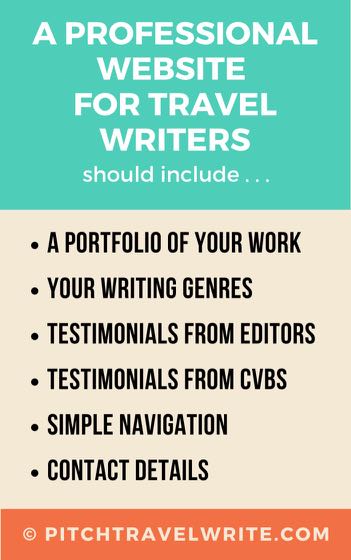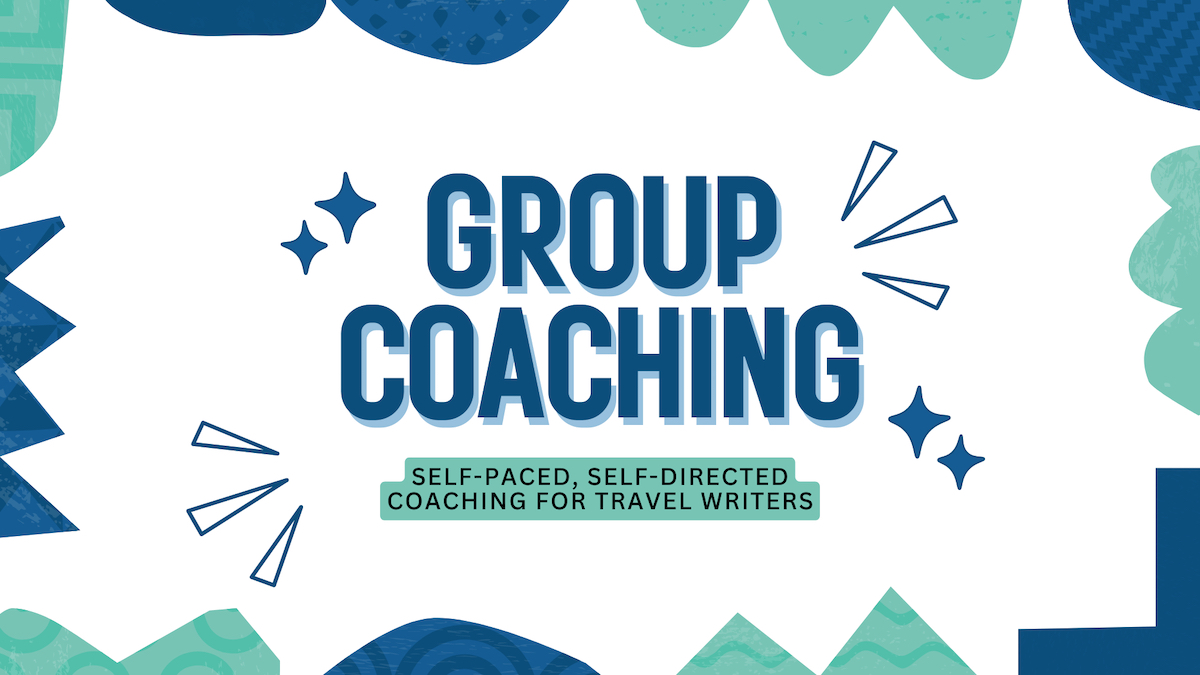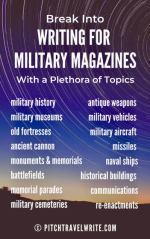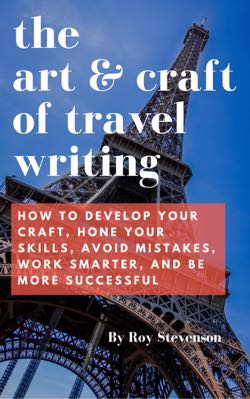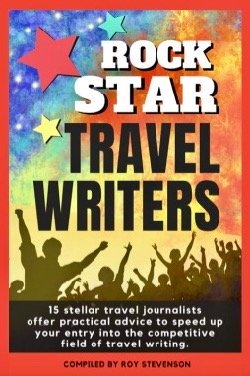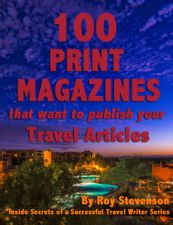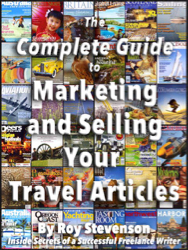- Home
- Business Basics for Travel Writers
- Marketing Yourself
Marketing Yourself
On the Road
By Roy Stevenson
Marketing yourself is the one skill you must have to be successful in travel writing.
Most aspiring travel writers believe that being a good writer is what determines their ultimate success in this game. It’s true you need to be a good writer to be successful. But writing talent
alone won’t make you a success.
Successful freelance writers who make a living in this business all have one thing in common:
they’re good at marketing.
The first thing you need to be good at is selling (marketing) your story idea
to whoever might be interested in buying it. It’s the
most important way you need to market yourself. But it’s not the whole
story.
Successful freelance writers also are good at keeping their name out
there in front of the media, the public and even their peers. They are
constantly reminding people about what they have to offer.
As a
freelancer, you are marketing yourself wherever you are, all the time.
Even if you’re doing it poorly, you’re giving someone an impression
about you. It would be better to give a good impression, of course, and
that’s what this article is about.
Marketing is not something
you switch on and off. It’s an integral part of your job and you use
it when you’re on the phone, writing emails, sending out query letters,
or in the field.

If the word “marketing” makes you nervous, think of it as your professional branding.
Everything you do leaves an impression.
Maybe marketing yourself scares you. If so, read on. There are some specific things you can do in preparation and they’re easy.
Here are five tips about marketing yourself while you are out in public, on the road, on a press trip or whenever you are outside of your office. Do these five things, and before long you will have mastered the basics of marketing yourself:
1. Marketing Yourself on the Road:
Have Plenty of Business Cards
Always have a stack of business cards with you. You never know when you will meet someone who will be interested in what you do. Give your card to everyone you meet during your travels. It will help them to remember you.
If you are on a press trip or at a writers conference, bring
twice as many business cards as you think you will need. Even when I
do this, I sometimes come perilously close to running out. You don’t
want to be scribbling your email address on a cocktail napkin when
you’re talking with a potential client.
Whether you’re on a press
trip, at a writing conference, or in the tourist office, always be
conscious that you’re marketing yourself to your hosts, tour guides and
fellow writers. Having business cards is the easiest way to do this.
2. Market Yourself with an Elevator Pitch
When you’re on the road, there will be spontaneous encounters that you haven’t planned on. For this you need to be prepared. You already have your business cards with you,right?

The simplest form of elevator speech is best because you want it to be something you can memorize. It needs to be easy to remember when you’re in an unexpected situation. You don’t want to stumble over your words.
Remember,
the idea behind an elevator pitch is that you can say it during a
chance encounter on an elevator – in about 20-30 seconds.
At a minimum, your elevator speech should include answers to these questions:
- Who are you?
- What do you do?
-
How do you add value? (This means who do you serve and how do you
serve them, do you serve a special niche, or do something in a unique
way that sets you apart from others.)
Here’s an example of what I might say when I happen upon a military museum during my travels:
“Hi. My name is Roy Stevenson. I’m a travel writer and I specialize in writing articles about military museums.”
Usually
the first question after this is “who do you write for?” Now we’re
past the elevator speech and into a conversation, which is the whole
point. An elevator speech breaks the ice.
Now I can tell them
all the different publications that buy my articles in the military
market. And I can make a request to tour the museum as a natural part
of the conversation.
Your elevator speech should be brief but
enticing so that they want to know more. Once you’ve hooked them to ask
questions, now you have a conversation going.
Your elevator
speech will change over time, and you will have to make slight
modifications on the spot. For example, if I’m at a luxury resort my
elevator speech will change for that niche.
Be prepared to
alter your to pitch for each special niche where you have expertise.
And be prepared for the follow-on questions about where you’ve been
published in each niche.
It’s important that you memorize your
elevator speech and that you practice it out loud until it’s as easy to
say as your own name. That way, you will feel confident when the time
comes to use it.
3. Visit Tourism Agencies to Meet Your Contact
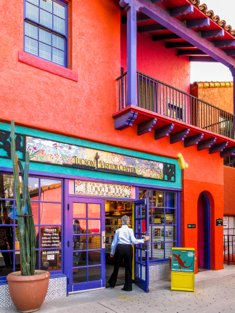
When you’re on the road, whether it’s a personal trip or a self-guided tour of a new place, always make a point of stopping in at the local tourist office and introducing yourself.
If the tourist office is sponsoring your trip, schedule this visit early on your tour. Not only is it good manners, but if they’re hosting you, they will usually have a packet of information waiting for you.
The media packet typically includes vouchers, maps and other useful information, plus your itinerary with names of people you will meet during the tour.
This face-to-face meeting cements your relationship far more than the email relationship you’ve had up to this point. Everyone likes to match a face to a name.
4. Have a Short Vitae (or Writing Summary) for Media Conferences
When you attend any kind of meetings or conferences where you meet PR/Media representatives, editors, or publishers, have a one-page vitae of your best writing achievements to give to them.
This tip for marketing yourself is far better than a business card. What you want them to know about you is written on that paper. It can be used as a conversation starter. It can be used to have deeper discussions so they can understand your experience. And it can be used for reference back in their office.
Although I’m sure some of them end up into the hotel trash bin, from experience I also know that many make it into files back in their office, ready for follow-up.
In terms of marketing yourself, it’s much better when it comes to assigning work or inviting you on a press trip because it tells about your experience.
5. Handling Chance Encounters
Here's an example:
Let’s
say you’re on a press trip and have just found a museum that you can
easily sell a story about. How do you market yourself?
Introduce
yourself to the museum’s media director or curator, press your business
card into their hand, and tell them briefly about yourself (use your
elevator speech to get started).
Tell them how excited you are to
visit their museum. If you can think of a potential publication for a
story about the museum, tell them that you have a potential outlet.
You
want to tell them enough so they know you’re a professional writer and
can help them market their museum, but let the conversation flow
naturally.
Usually they are delighted to meet you. This is because you’re helping them do their job. You’re helping them with publicity.
Ask
if they can give (or send) you any materials about the museum, such as
digital photos, a media CD, a press packet, or a book, for reference.
Don’t
be afraid to ask for information. They want free publicity and they
want you to get the information right. Many PRs or curators have given
me beautiful books about their museum to ensure an accurate article.
Tell
the director or media person you’d like to follow up with them by email
or phone in the near future after you have contacted your editors about
the potential story idea. Be sure to ask for their card if they
haven’t already given it to you.
Practice these techniques for marketing yourself and you’ll have a more interesting trip. You’ll build stronger relationships with PR and tourist
representatives, and you’re likely to find yourself with more press trip
invitations.
Marketing yourself is one of your most crucial skills as a
freelance travel writer. Everything you do leaves an impression. Make
it a good one.

Special Report:
How to Land Press Trips and Fam Tours
I've written a guide about how to land press trips. It will tell you everything you want to know about how to get into the inner circle and get invited on regional, national and international press trips.
More related articles that will interest you:
Travel Writing Secrets for Success - Part 2
Press Trips and Low Cost Travel
Press Trip Etiquette for Writers

Roy Stevenson is a professional travel writer and the author of www.PitchTravelWrite.com. Over the past ten years, he’s had more than 1000 articles published in 200 magazines, trade and specialty journals, in-flights, on-boards, blogs and websites and has traveled on assignment around the U.S. and to dozens of international destinations.
IF YOU ENJOYED THIS POST, GET UPDATES. IT'S FREE.
